Burt A. The Evolution of the British Empire and Commonwealth From the American Revolution
Подождите немного. Документ загружается.

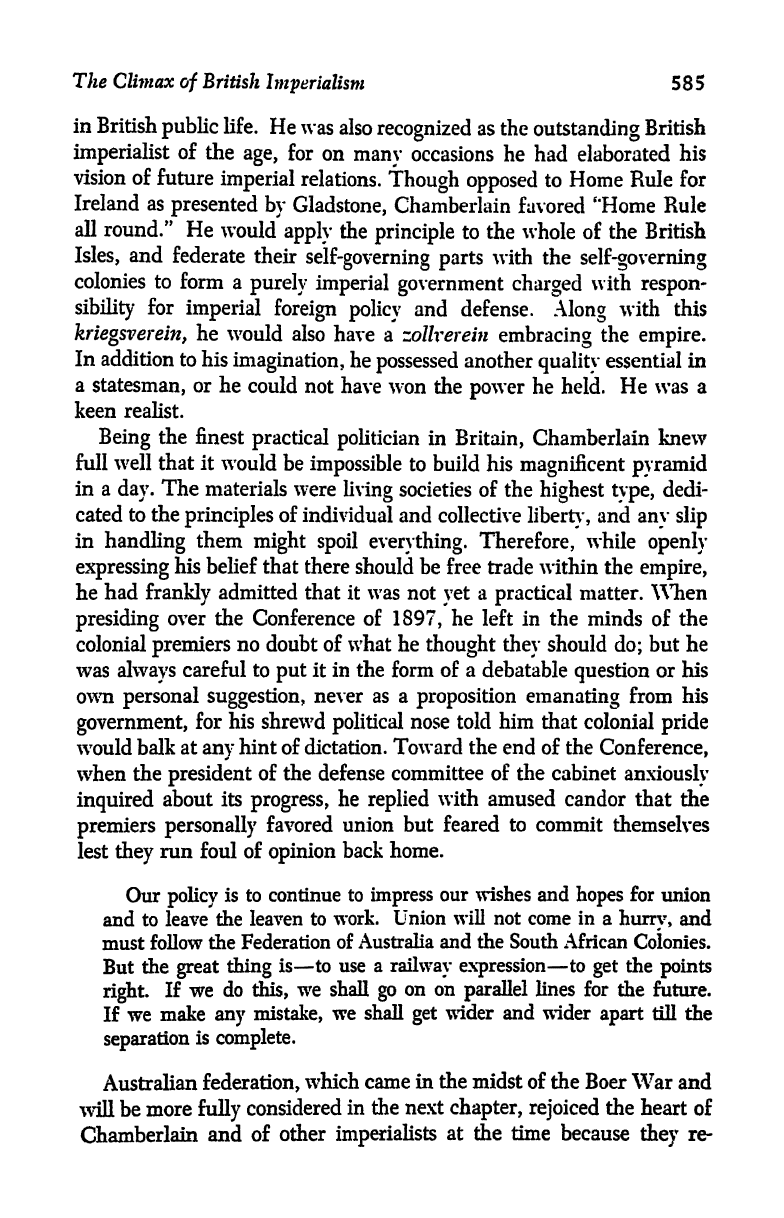
The
Climax
of
British
Imperialism
585
in
British
public
life.
He
was
also
recognized
as
the
outstanding
British
imperialist
of
the
age,
for on
many
occasions he had elaborated
his
vision
of future
imperial
relations,
though opposed
to
Home
Rule for
Ireland
as
presented
by
Gladstone,
Chamberlain
favored "Home
Rule
all
round."
He
would
apply
the
principle
to the
whole
of
the British
Isles,
and
federate
their
self-governing parts
with
the
self-governing
colonies to
form
a
purely
imperial
government
charged
with
respon-
sibility
for
imperial
foreign
policy
and defense.
Along
with this
kriegsverein,
he
would also have
a
zollrerein
embracing
the
empire.
In
addition
to
his
imagination,
he
possessed
another
quality
essential
in
a
statesman,
or
he
could
not have
won the
power
he held.
He was
a
keen
realist.
Being
the
finest
practical
politician
in
Britain,
Chamberlain
knew
full well that it
would be
impossible
to
build
his
magnificent pyramid
in a
day.
The
materials
were
living
societies of the
highest
type,
dedi-
cated to
the
principles
of
individual and collective
liberty,
and
any slip
in
handling
them
might
spoil
everything.
Therefore,
while
openly
expressing
his
belief
that
there
should be free
trade
within
the
empire,
he
had
frankly
admitted that
it was not
yet
a
practical
matter.
When
presiding
over the
Conference of
1897,
he
left
in the
minds
of
the
colonial
premiers
no doubt of what he
thought they
should
do;
but he
was
always
careful
to
put
it
in the
form
of a
debatable
question
or his
own
personal suggestion,
never as a
proposition
emanating
from
his
government,
for
his
shrewd
political
nose told
him
that
colonial
pride
w
y
ould
balk
at
any
hint
of
dictation. Toward
the
end
of
the
Conference,
when
the
president
of the defense
committee of the cabinet
anxiously
inquired
about
its
progress,
he
replied
with
amused
candor that the
premiers
personally
favored
union
but
feared
to commit
themselves
lest
they
run
foul of
opinion
back home.
Our
policy
is
to continue
to
impress
our wishes and
hopes
for union
and
to leave
the
leaven
to
work.
Union
will not
come
in
a
hurry,
and
must
follow
the
Federation
of Australia
and the South
African
Colonies.
But
the
great
thing
is to use
a
railway expression
to
get
the
points
right.
If
we
do
this,
we
shall
go
on on
parallel
lines for the
future.
If
we
make
any
mistake,
we shall
get
wider and wider
apart
till
the
separation
is
complete.
Australian
federation,
which came
in the midst
of
the
Boer
War and
will
be
more
fully
considered
in the
next
chapter,
rejoiced
the
heart
of
Chamberlain
and
of
other
imperialists
at the time
because
they
re-
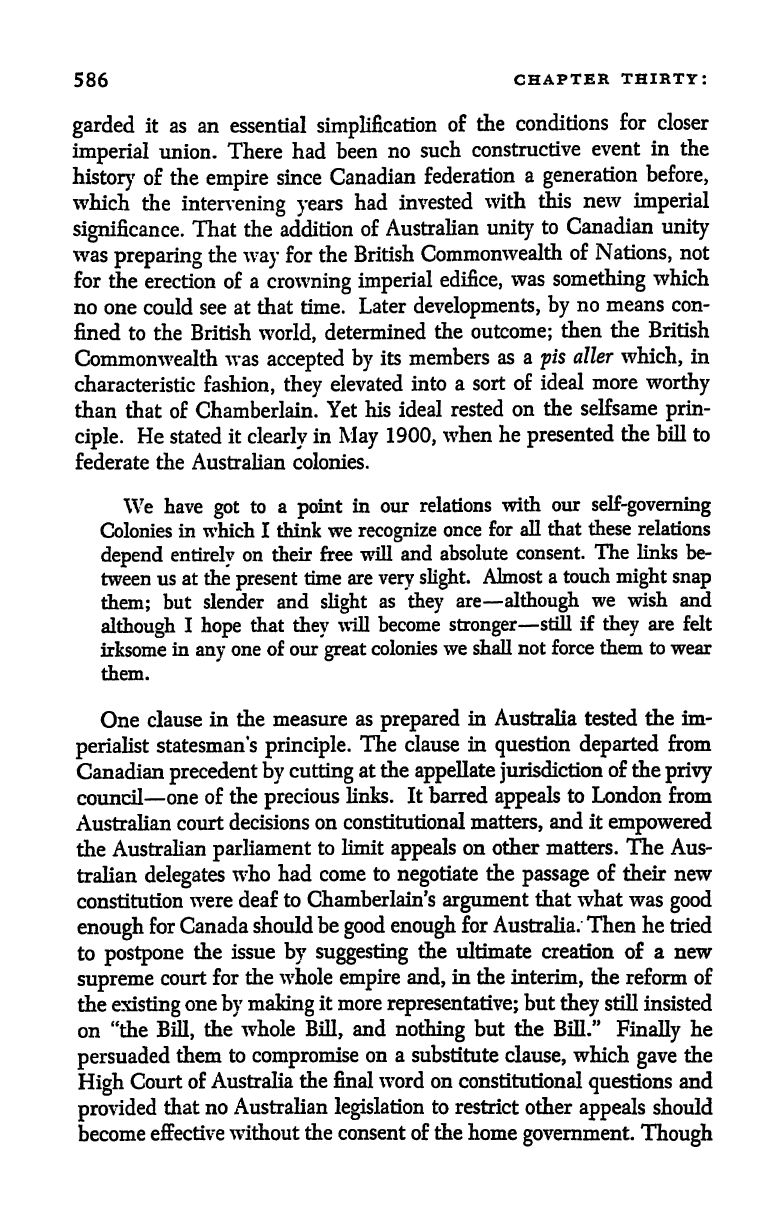
586
CHAPTER
THIRTY:
garded
it as an essential
simplification
of
the conditions
for closer
imperial
union.
There had
been
no
such
constructive
event
in
the
history
of the
empire
since Canadian
federation
a
generation
before,
which
the
intervening
years
had
invested
with
this
new
imperial
significance.
That the addition
of
Australian
unity
to Canadian
unity
%vas
preparing
the
way
for
the
British
Commonwealth
of
Nations,
not
for
the
erection of
a
crowning
imperial
edifice,
was
something
which
no
one
could see at
that time.
Later
developments,
by
no
means con-
fined
to
the
British
world,
determined
the
outcome;
then the British
Commonwealth
was
accepted
by
its members
as
a
pis
oiler
which,
in
characteristic
fashion,
they
elevated
into
a sort
of
ideal
more
worthy
than
that
of Chamberlain.
Yet his ideal
rested
on
the
selfsame
prin-
ciple.
He stated
it
clearly
in
May
1900,
when he
presented
the bill
to
federate the Australian colonies.
We have
got
to
a
point
in
our
relations
with
our
self-governing
Colonies
in
which
I
think
we
recognize
once
for
all
that
these
relations
depend
entirely
on their
free
will
and
absolute
consent.
The links
be-
tween
us
at the
present
time
are
very slight.
Almost
a
touch
might
snap
them;
but
slender
and
slight
as
they
are
although
we wish and
although
I
hope
that
they
will become
stronger
still
if
they
are felt
irksome
in
any
one of
our
great
colonies
we
shall
not force
them to wear
them.
One
clause
in
the measure
as
prepared
in Australia tested the
im-
perialist
statesman's
principle.
The
clause
in
question departed
from
Canadian
precedent
by cutting
at the
appellate jurisdiction
of the
privy
council
one
of
the
precious
links.
It barred
appeals
to London
from
Australian
court
decisions
on
constitutional
matters,
and
it
empowered
the
Australian
parliament
to limit
appeals
on
other matters. The
Aus-
tralian
delegates
who had come
to
negotiate
the
passage
of
their new
constitution
were
deaf
to Chamberlain's
argument
that what
was
good
enough
for
Canada
should be
good
enough
for Australia. Then he
tried
to
postpone
the issue
by
suggesting
the
ultimate creation
of
a new
supreme
court
for
the whole
empire
and,
in
the
interim,
the
reform
of
the
existing
one
by
making
it
more
representative;
but
they
still insisted
on
"the
Bill,
the' whole
Bill,
and
nothing
but
the
Bill."
Finally
he
persuaded
them
to
compromise
on
a
substitute
clause,
which
gave
the
High
Court
of
Australia
the
final word on
constitutional
questions
and
provided
that
no Australian
legislation
to
restrict
other
appeals
should
become
effective
without
the consent
of
the
home
government.
Though
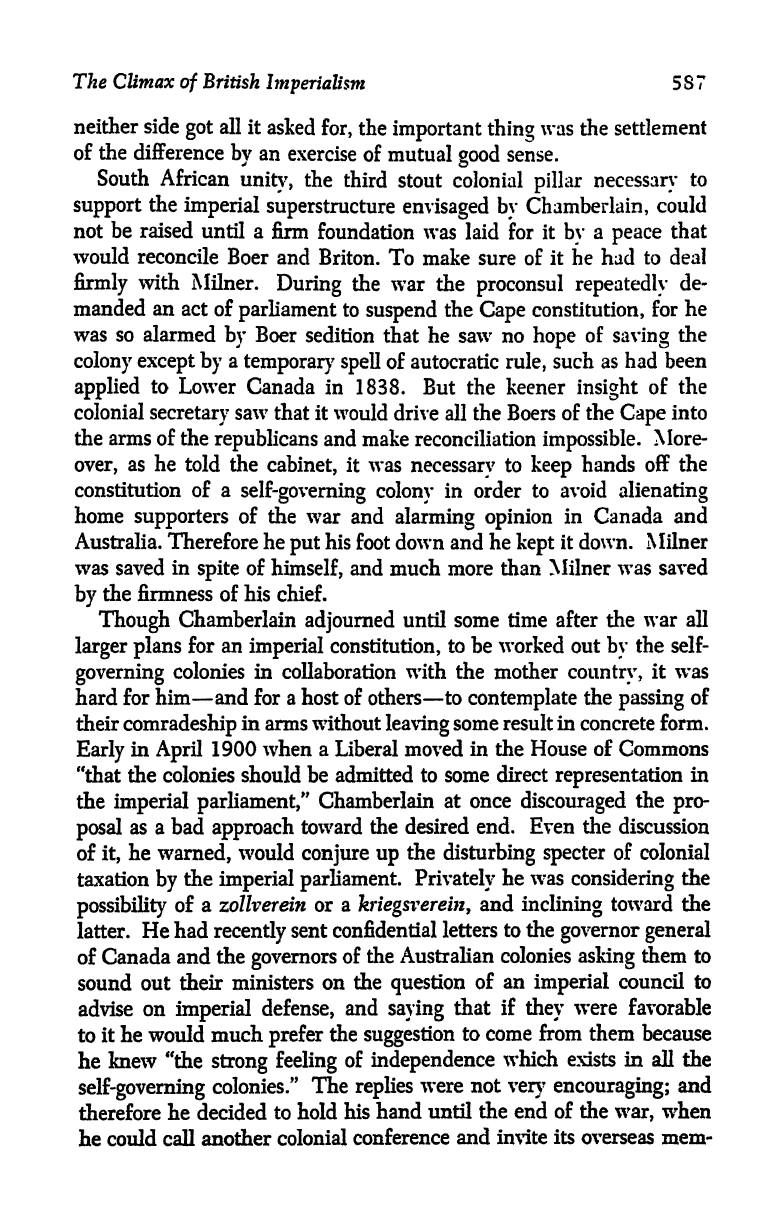
The
Climax
of
British
Imperialism
5
S 7
neither side
got
all
it
asked
for,
the
important
thing
was the
settlement
of
the
difference
by
an
exercise
of mutual
good
sense.
South
African
unity,
the
third stout
colonial
pillar
necessary
to
support
the
imperial
superstructure
envisaged
by
Chamberlain,
could
not
be raised
until
a
firm
foundation was laid for
it
by
a
peace
that
would reconcile
Boer and
Briton.
To
make sure of it
he had to
deal
firmly
with
Milner.
During
the war the
proconsul repeatedly
de-
manded
an
act
of
parliament
to
suspend
the
Cape
constitution,
for
he
was
so
alarmed
by
Boer
sedition
that he saw
no
hope
of
saving
the
colony except
by
a
temporary spell
of autocratic
rule,
such as
had been
applied
to Lower
Canada
in
1838. But the
keener
insight
of
the
colonial
secretary
saw
that it
would drive all
the Boers
of the
Cape
into
the
arms of
the
republicans
and make reconciliation
impossible.
More-
over,
as
he
told
the
cabinet,
it
was
necessary
to
keep
hands off
the
constitution of a
self-governing
colony
in order to avoid
alienating
home
supporters
of the war
and
alarming
opinion
in
Canada
and
Australia.
Therefore he
put
his
foot down and he
kept
it
down.
Milner
was saved
in
spite
of
himself,
and much more
than Milner was saved
by
the firmness
of his chief.
Though
Chamberlain
adjourned
until some
time after the
war
all
larger
plans
for
an
imperial
constitution,
to be worked out
by
the
self-
governing
colonies in
collaboration
with the
mother
country,
it was
hard for
him and
for
a
host of
others
to
contemplate
the
passing
of
their
comradeship
in
arms without
leaving
some
result in
concrete
form.
Early
in
April
1900 when
a
Liberal
moved
in the House
of
Commons
"that the colonies should be
admitted
to
some
direct
representation
in
the
imperial parliament,"
Chamberlain
at once
discouraged
the
pro-
posal
as
a bad
approach
toward
the desired end.
Even the
discussion
of
it,
he
warned,
would
conjure up
the
disturbing
specter
of colonial
taxation
by
the
imperial parliament.
Privately
he was
considering
the
possibility
of
a zollverein
or
a
kriegsverein,
and
inclining
toward the
latter.
He had
recently
sent confidential
letters to
the
governor general
of
Canada
and
the
governors
of
the Australian colonies
asking
them
to
sound
out
their ministers
on
the
question
of
an
imperial
council to
advise
on
imperial
defense,
and
saying
that if
they
were
favorable
to
it
he would much
prefer
the
suggestion
to come from them because
he
knew "the
strong
feeling
of
independence
which
exists
in all the
self-governing
colonies."
The
replies
were
not
very
encouraging;
and
therefore
he
decided
to
hold
his
hand until the
end of the
war,
when
he
could
call
another
colonial
conference
and invite
its
overseas
mem-
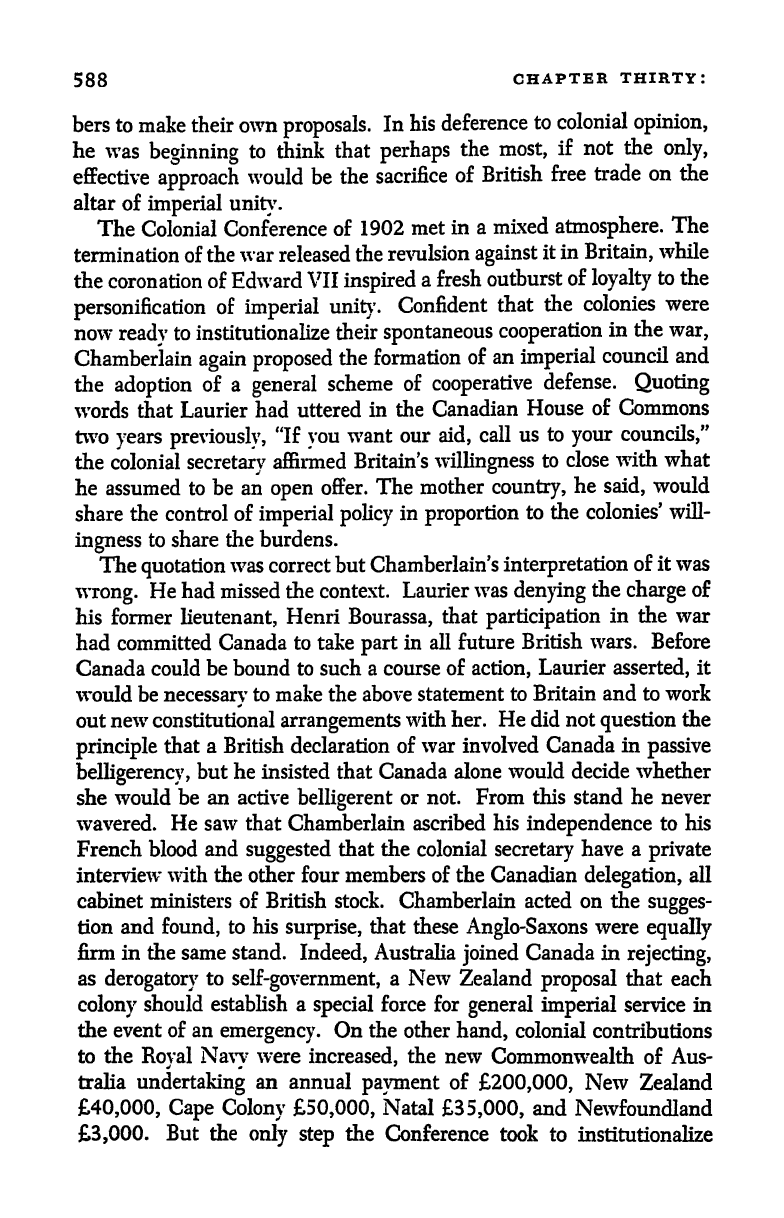
588
CHAPTER
THIRTY:
bers
to make their
own
proposals.
In
his
deference
to colonial
opinion,
he
was
beginning
to think
that
perhaps
the
most,
if
not the
only,
effective
approach
would
be
the
sacrifice
of
British
free
trade on
the
altar
of
imperial
unit}
7
.
The
Colonial
Conference
of
1902
met
in
a mixed
atmosphere.
The
termination of
the
war
released
the
revulsion
against
it in
Britain,
while
the coronation of Edward
VII
inspired
a
fresh
outburst
of
loyalty
to the
personification
of
imperial
unity.
Confident
that
the
colonies
were
now
ready
to
institutionalize their
spontaneous
cooperation
in the
war,
Chamberlain
again
proposed
the formation
of
an
imperial
council and
the
adoption
of a
general
scheme
of
cooperative
defense.
Quoting
words
that Laurier had
uttered
in
the
Canadian
House
of Commons
two
years
previously,
"If
you
want
our
aid,
call
us
to
your
councils,"
the
colonial
secretary
affirmed
Britain's
willingness
to
close
with
what
he assumed to
be an
open
offer.
The
mother
country,
he
said,
would
share
the
control of
imperial policy
in
proportion
to the colonies'
will-
ingness
to
share
the burdens.
The
quotation
was correct
but
Chamberlain's
interpretation
of
it was
wrong.
He
had
missed
the
context.
Laurier
was
denying
the
charge
of
his
former
lieutenant,
Henri
Bourassa,
that
participation
in
the war
had committed Canada
to take
part
in all
future
British wars. Before
Canada could
be
bound
to such a course
of
action,
Laurier
asserted,
it
would
be
necessary
to make the above
statement
to
Britain
and to work
out
new
constitutional
arrangements
with her.
He
did not
question
the
principle
that
a
British declaration
of
war involved
Canada
in
passive
belligerency,
but he insisted that Canada
alone would decide whether
she
would
be
an active
belligerent
or
not.
From
this
stand
he never
wavered.
He saw that
Chamberlain
ascribed
his
independence
to his
French
blood
and
suggested
that the
colonial
secretary
have a
private
interview
with
the other four members of the Canadian
delegation,
all
cabinet
ministers of British stock.
Chamberlain
acted on the
sugges-
tion
and
found,
to his
surprise,
that these
Anglo-Saxons
were
equally
firm
in
the
same stand.
Indeed,
Australia
joined
Canada in
rejecting,
as
derogatory
to
self-government,
a New
Zealand
proposal
that
each
colony
should establish
a
special
force for
general imperial
service
in
the event of an
emergency.
On the other
hand,
colonial
contributions
to the
Royal Navy
were
increased,
the
new
Commonwealth
of
Aus-
tralia
undertaking
an annual
payment
of
200,000,
New
Zealand
40,000,
Cape Colony
50,000,
Natal
35,000,
and
Newfoundland
3,000.
But
the
only
step
the
Conference
took to
institutionalize
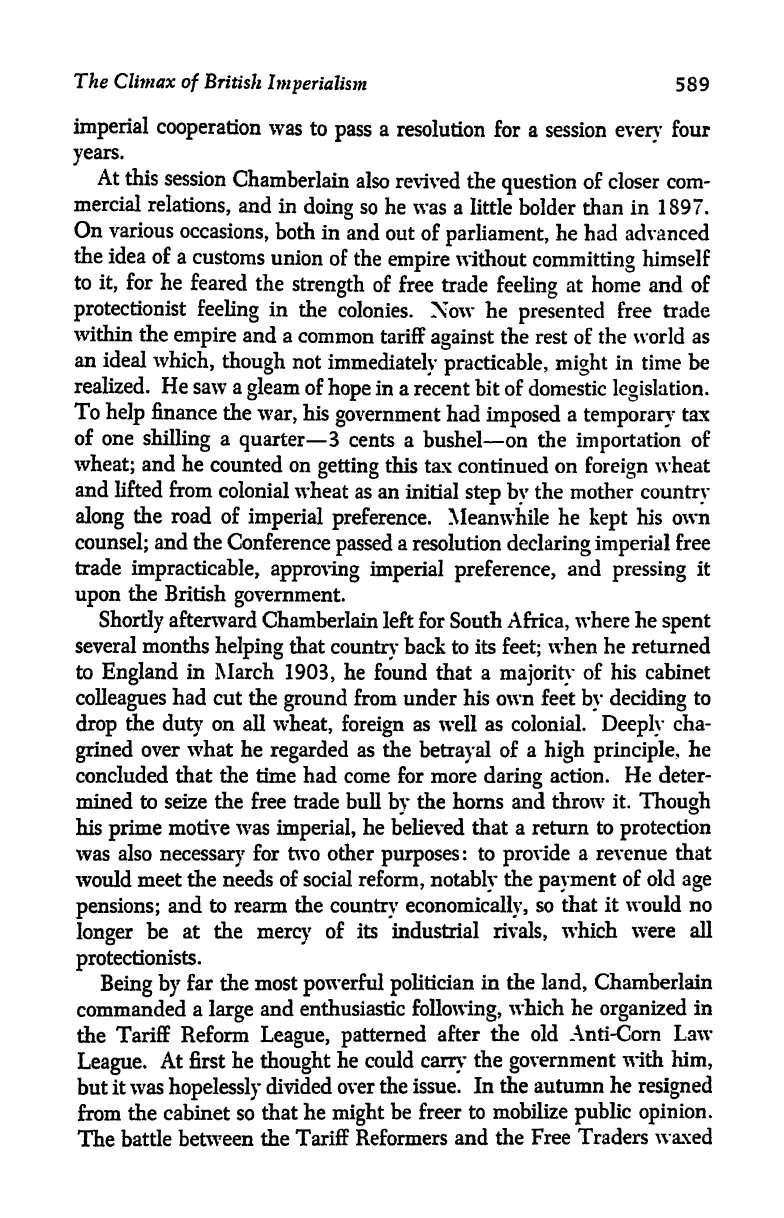
The Climax
of
British
Imperialism
589
imperial
cooperation
was
to
pass
a
resolution for a
session
even- four
years.
At
this
session
Chamberlain
also
revived
the
question
of closer
com-
mercial
relations,
and in
doing
so
he
was a little
bolder than
in 1897.
On various
occasions,
both
in
and out of
parliament,
he had
advanced
the
idea of
a
customs
union
of
the
empire
without
committing
himself
to
it,
for he
feared
the
strength
of
free trade
feeling
at home and
of
protectionist
feeling
in
the
colonies. Now he
presented
free trade
within
the
empire
and
a
common
tariff
against
the rest of
the
world
as
an
ideal
which,
though
not
immediately
practicable, might
in time be
realized.
He
saw
a
gleam
of
hope
in a recent bit of domestic
legislation.
To
help
finance
the
war,
his
government
had
imposed
a
temporary
tax
of one
shilling
a
quarter
3
cents a
bushel on the
importation
of
wheat;
and he
counted
on
getting
this
tax
continued
on
foreign
wheat
and
lifted from
colonial
wheat
as an
initial
step by
the mother
country
along
the
road of
imperial preference.
Meanwhile he
kept
his own
counsel;
and the
Conference
passed
a
resolution
declaring imperial
free
trade
impracticable,
approving imperial preference,
and
pressing
it
upon
the
British
government.
Shortly
afterward
Chamberlain left for South
Africa,
where he
spent
several
months
helping
that
country
back
to
its
feet;
when
he returned
to
England
in
March
1903,
he
found
that a
majority
of
his cabinet
colleagues
had cut the
ground
from under his own
feet
by
deciding
to
drop
the
duty
on
all
wheat,
foreign
as
well
as
colonial.
Deeply
cha-
grined
over what he
regarded
as the
betrayal
of a
high
principle,
he
concluded
that
the time had
come
for
more
daring
action.
He deter-
mined
to seize
the
free trade
bull
by
the horns
and throw
it.
Though
his
prime
motive was
imperial,
he
believed
that a return
to
protection
was
also
necessary
for two other
purposes:
to
provide
a revenue that
would
meet
the needs
of
social
reform,
notably
the
payment
of
old
age
pensions;
and to
rearm the
country
economically,
so
that it would no
longer
be
at the
mercy
of its industrial
rivals,
which
were
all
protectionists.
Being
by
far
the
most
powerful
politician
in the
land,
Chamberlain
commanded
a
large
and enthusiastic
following,
which
he
organized
in
the
Tariff
Reform
League,
patterned
after the old Anti-Corn
Law
League.
At
first he
thought
he
could
cam'
the
government
with
him,
but
it
was
hopelessly
divided
over
the issue.
In the
autumn he
resigned
from
the
cabinet so
that
he
might
be freer
to
mobilize
public opinion.
The
battle
between
the Tariff
Reformers
and
the
Free
Traders waxed
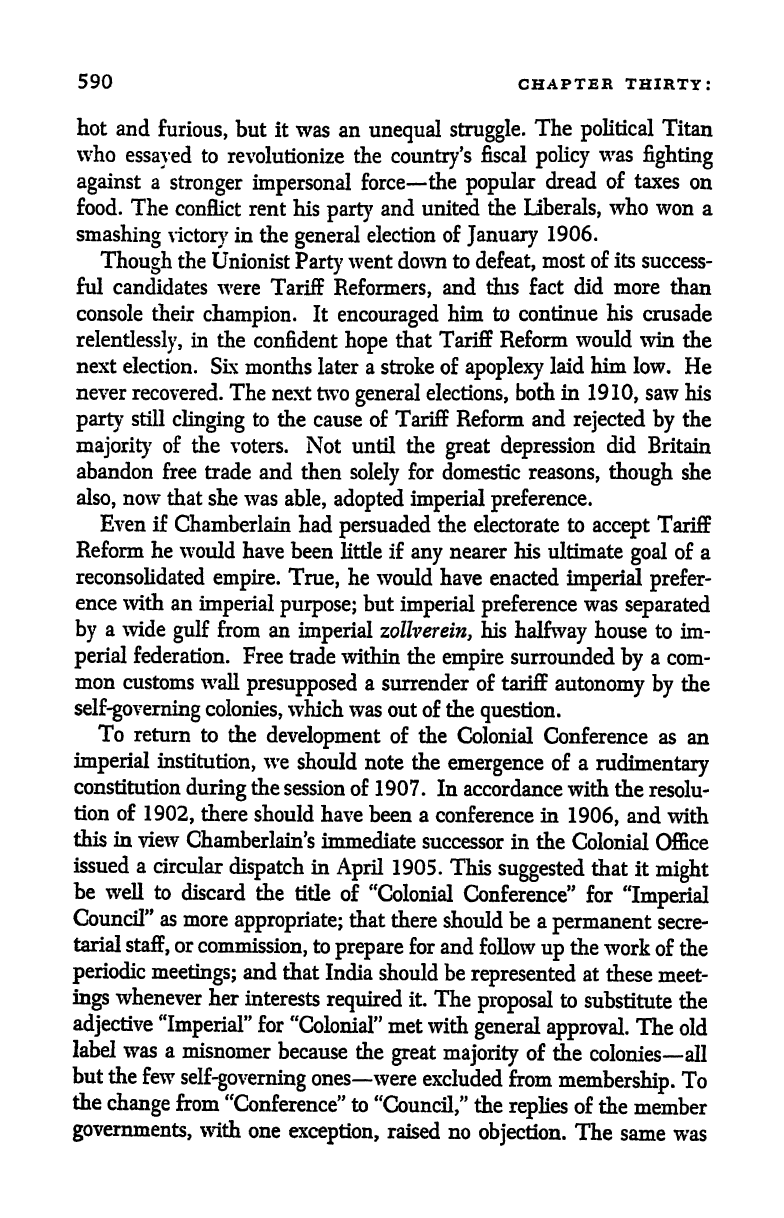
590
CHAPTER
THIRTY:
hot
and
furious,
but it
was
an
unequal
struggle.
The
political
Titan
who
essayed
to
revolutionize
the
country's
fiscal
policy
was
fighting
against
a
stronger impersonal
force
the
popular
dread
of
taxes
on
food.
The
conflict
rent his
party
and
united
the
Liberals,
who
won a
smashing
victory
in
the
general
election
of
January
1906.
Though
the
Unionist
Party
went down to
defeat,
most of its
success-
ful
candidates were
Tariff
Reformers,
and this fact
did more
than
console
their
champion.
It
encouraged
him to continue
his
crusade
relentlessly,
in
the
confident
hope
that
Tariff Reform would win
the
next
election. Six
months later a stroke
of
apoplexy
laid
him
low.
He
never
recovered.
The next two
general
elections,
both
in
1910,
saw
his
party
still
clinging
to
the cause of Tariff Reform
and
rejected
by
the
majority
of the
voters.
Not
until the
great
depression
did
Britain
abandon
free
trade
and then
solely
for
domestic
reasons,
though
she
also,
now
that
she was
able,
adopted
imperial preference.
Even
if
Chamberlain
had
persuaded
the electorate
to
accept
Tariff
Reform
he
would
have been
little
if
any
nearer
his
ultimate
goal
of
a
reconsolidated
empire.
True,
he
would have enacted
imperial
prefer-
ence with an
imperial
purpose;
but
imperial
preference
was
separated
by
a
wide
gulf
from an
imperial
zottverein,
his
halfway
house
to im-
perial
federation. Free
trade within the
empire
surrounded
by
a
com-
mon
customs
wall
presupposed
a
surrender
of
tariff
autonomy
by
the
self-governing
colonies,
which
was out
of the
question.
To
return
to the
development
of the
Colonial
Conference
as an
imperial
institution,
we
should note the
emergence
of a
rudimentary
constitution
during
the
session
of 1907.
In
accordance with
the
resolu-
tion
of
1902,
there
should have
been a
conference
in
1906,
and with
this in
view
Chamberlain's
immediate
successor in
the
Colonial
Office
issued a
circular
dispatch
in
April
1905.
This
suggested
that
it
might
be
well
to
discard
the title
of
"Colonial
Conference" for
"Imperial
Council" as
more
appropriate;
that
there
should
be
a
permanent
secre-
tarial
staff,
or
commission,
to
prepare
for
and follow
up
the
work
of
the
periodic
meetings;
and that
India
should be
represented
at
these
meet-
ings
whenever
her
interests
required
it. The
proposal
to
substitute
the
adjective
"Imperial"
for
"Colonial" met
with
general
approval.
The
old
label
was
a
misnomer
because
the
great
majority
of
the
colonies all
but
the
few
self-governing
ones
were
excluded
from
membership.
To
the
change
from
"Conference" to
"Council,"
the
replies
of
the
member
governments,
with
one
exception,
raised
no
objection.
The
same
was
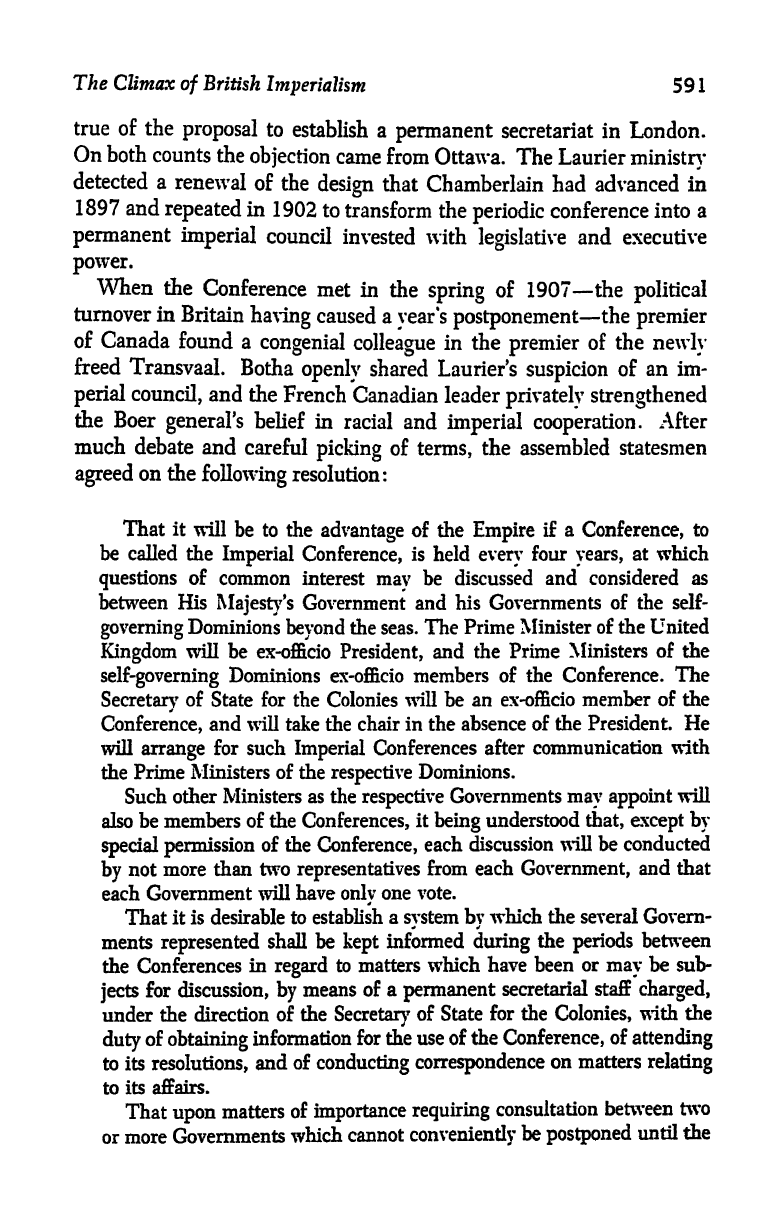
The Climax
of
British
Imperialism
59
1
true
of
the
proposal
to
establish a
permanent
secretariat in
London.
On
both
counts
the
objection
came
from Ottawa.
The Laurier
ministry
detected a
renewal
of
the
design
that
Chamberlain had advanced
in
1897
and
repeated
in
1902
to
transform
the
periodic
conference
into a
permanent
imperial
council
invested with
legislative
and executive
power.
When
the
Conference
met in
the
spring
of 1907 the
political
turnover
in
Britain
having
caused
a
year's postponement
the
premier
of Canada
found
a
congenial
colleague
in the
premier
of the
newly
freed
Transvaal.
Botha
openly
shared
Laurier's
suspicion
of
an
im-
perial
council,
and
the
French
Canadian leader
privately strengthened
the
Boer
general's
belief in
racial
and
imperial cooperation.
After
much debate
and
careful
picking
of
terms,
the assembled
statesmen
agreed
on the
following
resolution:
That it
will
be
to
the
advantage
of
the
Empire
if
a
Conference,
to
be
called the
Imperial
Conference,
is
held
every
four
years,
at which
questions
of
common
interest
may
be discussed
and considered
as
between His
Majesty's
Government and his Governments
of the self-
governing
Dominions
beyond
the seas.
The Prime
Minister
of the
United
Kingdom
will be
ex-officio
President,
and
the Prime
Ministers
of
the
self-governing
Dominions
ex-officio
members
of
the
Conference.
The
Secretary
of
State
for
the
Colonies
will
be
an ex-officio
member of the
Conference,
and will
take the
chair in the absence
of
the President. He
will
arrange
for
such
Imperial
Conferences
after
communication with
the
Prime
Ministers of
the
respective
Dominions.
Such
other
Ministers as the
respective
Governments
may
appoint
will
also
be members of the
Conferences,
it
being
understood
that,
except by
special permission
of
the
Conference,
each
discussion will
be conducted
by
not
more than
two
representatives
from each
Government,
and
that
each
Government
will
have
only
one
vote.
That
it is desirable
to
establish
a
system
by
which the several Govern-
ments
represented
shall be
kept
informed
during
the
periods
between
the Conferences
in
regard
to matters which
have been
or
may
be sub-
jects
for
discussion,
by
means of
a
permanent
secretarial
staff
charged,
under
the direction
of
the
Secretary
of State
for
the
Colonies,
with the
duty
of
obtaining
information
for the use of the
Conference,
of
attending
to its
resolutions,
and
of
conducting
correspondence
on matters
relating
to
its affairs.
That
upon
matters
of
importance
requiring
consultation
between
two
or
more
Governments
which
cannot
conveniently
be
postponed
until
the
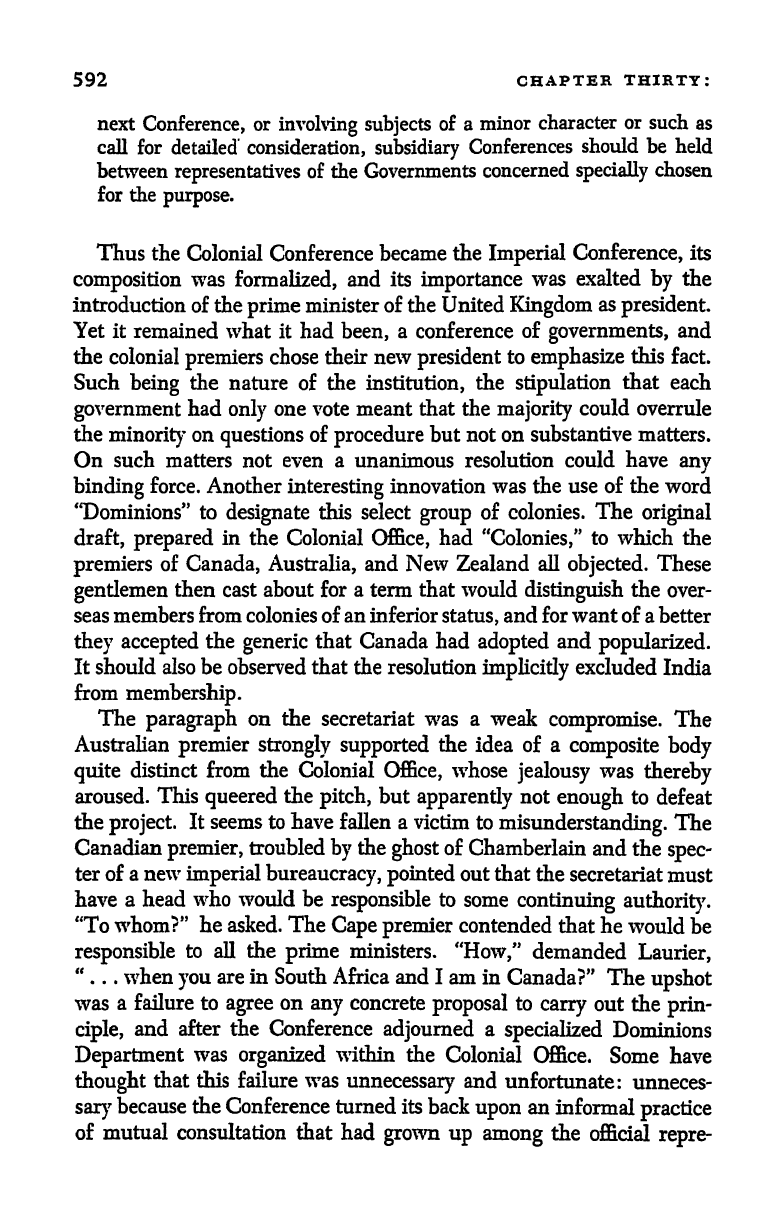
592
CHAPTER
THIRTY:
next
Conference,
or
involving
subjects
of a
minor
character
or
such
as
call for
detailed'
consideration,
subsidiary
Conferences
should
be
held
between
representatives
of
the Governments
concerned
specially
chosen
for
the
purpose.
Thus the
Colonial
Conference
became
the
Imperial
Conference,
its
composition
was
formalized,
and its
importance
was
exalted
by
the
introduction
of the
prime
minister
of the United
Kingdom
as
president.
Yet
it
remained
what it had
been,
a
conference
of
governments,
and
the
colonial
premiers
chose
their new
president
to
emphasize
this
fact.
Such
being
the
nature
of
the
institution,
the
stipulation
that
each
government
had
only
one
vote meant
that the
majority
could
overrule
the
minority
on
questions
of
procedure
but
not on
substantive
matters.
On
such matters
not even
a
unanimous
resolution
could have
any
binding
force. Another
interesting
innovation
was the
use of the
word
"Dominions"
to
designate
this select
group
of colonies.
The
original
draft,
prepared
in
the
Colonial
Office,
had
"Colonies,"
to
which the
premiers
of
Canada,
Australia,
and New Zealand
all
objected.
These
gentlemen
then cast
about
for
a
term
that
would
distinguish
the
over-
seas
members
from colonies
of
an inferior
status,
and
for want of
a
better
they
accepted
the
generic
that
Canada had
adopted
and
popularized.
It
should also be
observed
that
the resolution
implicitly
excluded
India
from
membership.
The
paragraph
on
the
secretariat was
a
weak
compromise.
The
Australian
premier strongly supported
the
idea
of
a
composite
body
quite
distinct from
the
Colonial
Office,
whose
jealousy
was
thereby
aroused.
This
queered
the
pitch,
but
apparently
not
enough
to
defeat
the
project.
It
seems
to
have
fallen a
victim
to
misunderstanding.
The
Canadian
premier,
troubled
by
the
ghost
of
Chamberlain
and the
spec-
ter of
a new
imperial bureaucracy, pointed
out that
the
secretariat
must
have
a head
who
would be
responsible
to
some
continuing
authority.
"To
whom?"
he
asked.
The
Cape
premier
contended
that
he
would
be
responsible
to
all
the
prime
ministers.
"How,"
demanded
Laurier,
"... when
you
are
in
South Africa and I
am in
Canada?"
The
upshot
was
a failure
to
agree
on
any
concrete
proposal
to
carry
out
the
prin-
ciple,
and
after the
Conference
adjourned
a
specialized
Dominions
Department
was
organized
within
the
Colonial
Office.
Some have
thought
that this failure was
unnecessary
and
unfortunate:
unneces-
sary
because
the
Conference
turned its
back
upon
an
informal
practice
of
mutual
consultation
that had
grown up
among
the
official
repre-
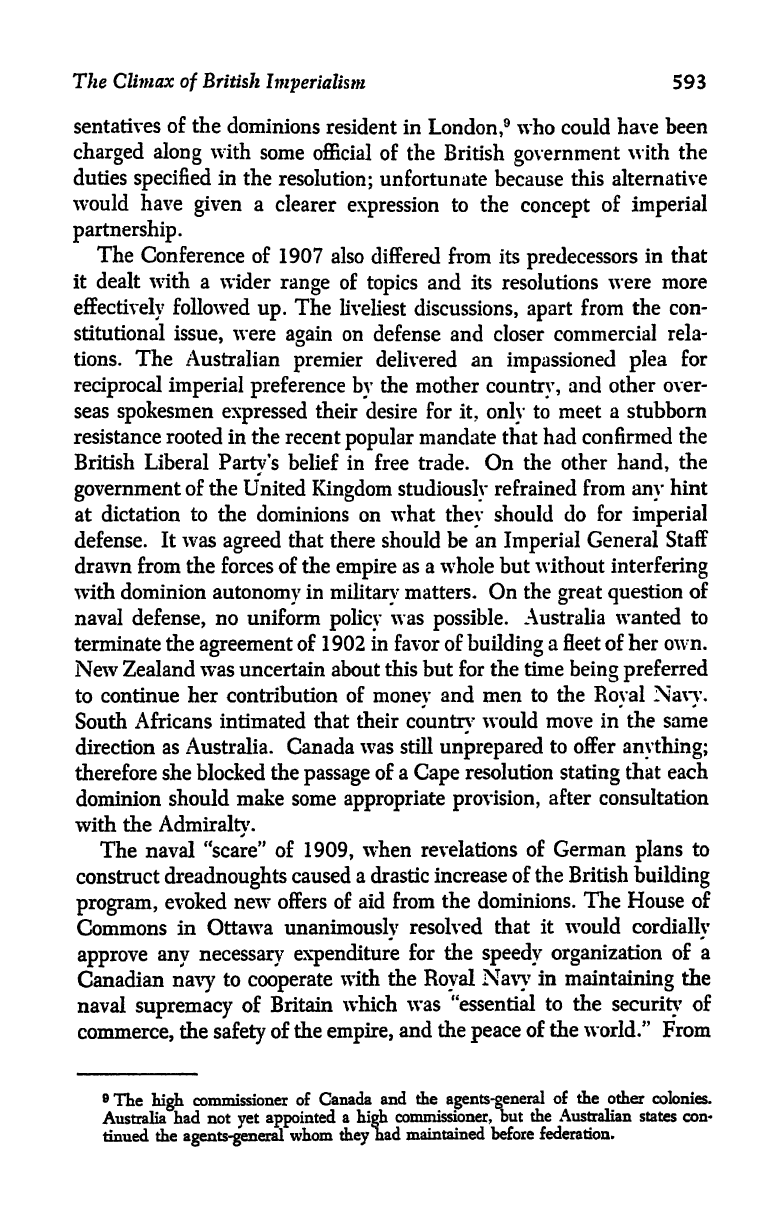
The
Climax
of
British
Imperialism
593
sentatives
of
the
dominions
resident in
London,
9
who
could have
been
charged along
with
some
official of the British
government
with the
duties
specified
in
the
resolution;
unfortunate because
this
alternative
would have
given
a
clearer
expression
to
the
concept
of
imperial
partnership.
The
Conference
of 1907
also
differed from its
predecessors
in that
it dealt
with
a
wider
range
of
topics
and its resolutions
were
more
effectively
followed
up.
The
liveliest
discussions,
apart
from
the con-
stitutional
issue,
were
again
on
defense and
closer commercial
rela-
tions. The
Australian
premier
delivered
an
impassioned
plea
for
reciprocal
imperial
preference
by
the mother
country,
and other
over-
seas
spokesmen
expressed
their
desire
for
it,
only
to meet
a stubborn
resistance
rooted in the recent
popular
mandate that
had confirmed
the
British Liberal
Party's
belief
in
free trade. On
the other
hand,
the
government
of the
United
Kingdom
studiously
refrained
from
any
hint
at dictation
to the
dominions
on
what
they
should
do
for
imperial
defense.
It
was
agreed
that
there
should
be
an
Imperial
General Staff
drawn
from the forces of
the
empire
as a whole but
without
interfering
with
dominion
autonomy
in
military
matters* On
the
great
question
of
naval
defense,
no uniform
policy
was
possible.
Australia
wanted
to
terminate the
agreement
of 1902 in favor of
building
a
fleet
of her
own,
New
Zealand was
uncertain about
this but for
the time
being preferred
to
continue
her contribution
of
money
and men to
the
Royal Navy.
South
Africans intimated
that their
country
would
move in the same
direction
as
Australia. Canada
was
still
unprepared
to offer
anything;
therefore
she
blocked
the
passage
of
a
Cape
resolution
stating
that each
dominion
should
make some
appropriate
provision,
after consultation
with
the
Admiralty.
The naval "scare"
of
1909,
when
revelations of German
plans
to
construct
dreadnoughts
caused
a drastic
increase
of
the British
building
program,
evoked new
offers of aid
from
the dominions. The House
of
Commons
in Ottawa
unanimously
resolved
that
it
would
cordially
approve
any
necessary expenditure
for
the
speedy organization
of
a
Canadian
navy
to
cooperate
with
the
Royal
Navy
in
maintaining
the
naval
supremacy
of
Britain
which
was
"essential
to
the
security
of
commerce,
the
safety
of
the
empire,
and the
peace
of the
world."
From
9
The
high
commissioner
of Canada
and the
agents-general
of the other
colonies.
Australia
had
not
yet
appointed
a
high
commissioner.,
but
the
Australian
states con-
tinued the
agents-general
whom
they
had
maintained
before
federation.
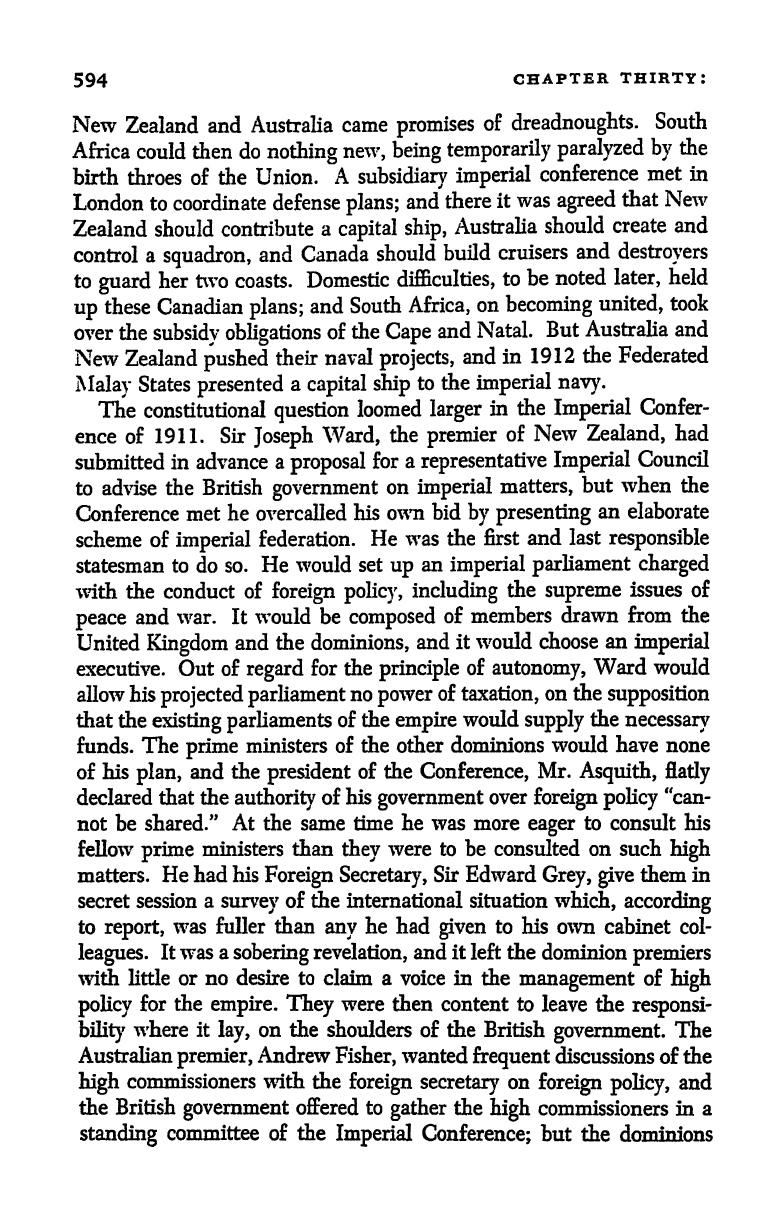
594
CHAPTER
THIRTY:
New
Zealand
and
Australia
came
promises
of
dreadnoughts.
South
Africa
could
then do
nothing
new,
being
temporarily
paralyzed
by
the
birth
throes
of
the Union.
A
subsidiary
imperial
conference
met
in
London
to
coordinate defense
plans;
and
there
it
was
agreed
that
New
Zealand
should contribute
a
capital
ship,
Australia
should
create
and
control
a
squadron,
and Canada
should
build
cruisers
and
destroyers
to
guard
her
two coasts.
Domestic
difficulties,
to
be
noted
later,
held
up
these
Canadian
plans;
and South
Africa,
on
becoming
united,
took
over the
subsidy
obligations
of
the
Cape
and
Natal.
But
Australia
and
New Zealand
pushed
their
naval
projects,
and
in
1912
the Federated
Malay
States
presented
a
capital
ship
to
the
imperial
navy.
The
constitutional
question
loomed
larger
in
the
Imperial
Confer-
ence
of
1911.
Sir
Joseph
Ward,
the
premier
of
New
Zealand,
had
submitted
in advance
a
proposal
for
a
representative
Imperial
Council
to advise
the
British
government
on
imperial
matters,
but when
the
Conference
met he overcalled
his own
bid
by
presenting
an
elaborate
scheme
of
imperial
federation.
He
was
the
first and
last
responsible
statesman
to
do
so.
He would
set
up
an
imperial
parliament charged
with
the conduct
of
foreign
policy,
including
the
supreme
issues
of
peace
and
war. It
would
be
composed
of
members
drawn
from
the
United
Kingdom
and the
dominions,
and
it would choose
an
imperial
executive.
Out of
regard
for
the
principle
of
autonomy,
Ward
would
allow his
projected
parliament
no
power
of
taxation,
on the
supposition
that
the
existing
parliaments
of the
empire
would
supply
the
necessary
funds.
The
prime
ministers of
the
other
dominions
would have
none
of
his
plan,
and
the
president
of the
Conference,
Mr.
Asquith, flatly
declared that
the
authority
of
his
government
over
foreign
policy
"can-
not
be
shared."
At the same time
he was more
eager
to
consult his
fellow
prime
ministers
than
they
were to be
consulted on such
high
matters.
He
had his
Foreign
Secretary,
Sir Edward
Grey,
give
them
in
secret
session
a
survey
of the
international
situation
which,
according
to
report,
was fuller
than
any
he had
given
to his own
cabinet col-
leagues.
It
was a
sobering
revelation,
and
it
left the
dominion
premiers
with
little or
no desire to
claim a voice in the
management
of
high
policy
for
the
empire. They
were then content
to leave the
responsi-
bility
where it
lay,
on
the
shoulders of the
British
government.
The
Australian
premier,
Andrew
Fisher,
wanted
frequent
discussions of the
high
commissioners
with
the
foreign secretary
on
foreign policy,
and
the
British
government
offered
to
gather
the
high
commissioners in
a
standing
committee
of
the
Imperial
Conference;
but
the dominions
